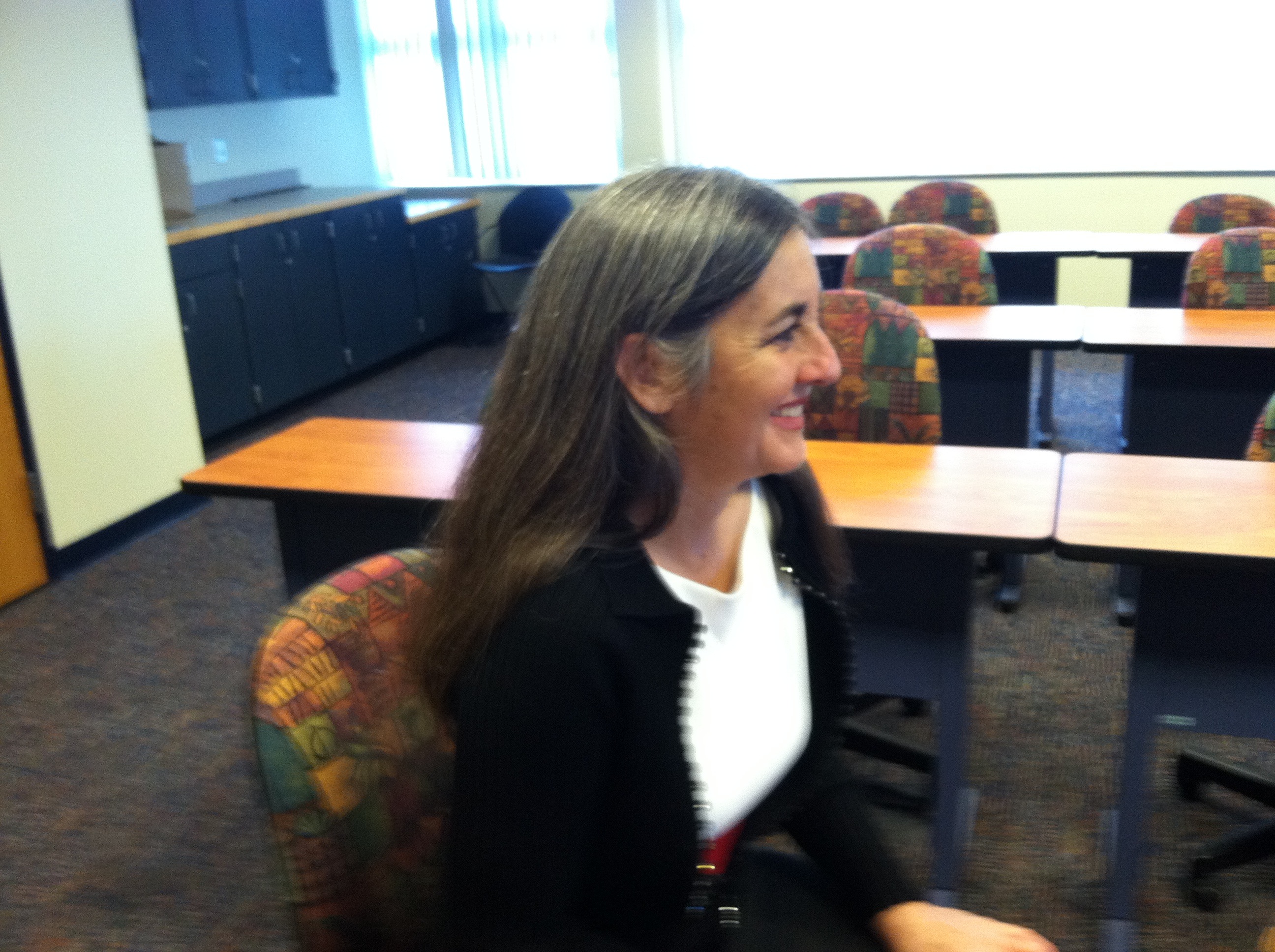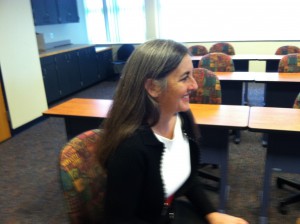
The Culture Of A Place Is Parallel To Landscape Of Place
Uncategorized November 12, 2013 Writer, naturalist, and activist Janisse Ray stopped by the Seminole Campus on Thursday, November 7 as part of her 3-campus tour of St. Petersburg College. The author of 4 books read from her memoir, Ecology of a Cracker Childhood, to open the lunch session.
Writer, naturalist, and activist Janisse Ray stopped by the Seminole Campus on Thursday, November 7 as part of her 3-campus tour of St. Petersburg College. The author of 4 books read from her memoir, Ecology of a Cracker Childhood, to open the lunch session.
Ms. Ray started by saying what a joy it was to speak to college aged students. She thought “St. Petersburg was full of very old tired people who had square dances and bingo until I got downtown and saw tons of young people doing wild and crazy things. It was like being on vacation. Thank you!”
Ms. Ray has devoted her life to learning stories of nature. Crackers, she said, have an interesting relationship with the environment. Growing up in a junkyard in the pine flatwoods, she learned that your culture is inextricably tied to your landscape, no matter where you are from. Humans are biological creatures dependent on the landscape for our very survival.
Her parents were fundamentally religious, she wasn’t allowed to wear pants, and her dad was bi-polar. One of the excerpts she read told how her father had a nervous breakdown and the impact that it had on her family. Her dad is a folk recycler, a person of vision who use throwaways to new purpose, for example, by making a grape arbor by wielding together truck drive shafts.
When telling of her father’s illness, Ms. Ray stopped to share for first of several writing hints. She was discussing her mother “making” sugar water to freeze peaches and pointed out her list of more active verbs to use to make her writing come alive. ‘Make’ was changed to ‘mix.’
Even though the family didn’t have a television and magazines weren’t allowed in the house, Ms. Ray’s parents wanted her to be educated, so she and her siblings were allowed to visit the library. Ms. Ray stated that when she graduated, she knew Dewey decimal system inside and out but didn’t know a weasel from warthog. She credits her interest in nature to her 6th grader teacher who told her about the Godfrey pine tress during recess. Ms. Ray learned that nature won’t ridicule, it will let you play.
Students and teachers both had eager questions:
You said you were an avid reader as a child. Your parents restricted what you did but not what you could read?
The TV taken out when my sister Kay was born, but we could go to library. Of course, our parents didn’t know we were sneaking Harlequins out with biographies. My father wanted us educated more than he feared what we might find.
I was very isolated in my childhood, but reading Flannery O’Conner at very young age and of course it affected me. Of course, it shaped me. Of course, I grew up to be a writer.
Did your father throw anything out? I have a hydrphonic garden in my back yard. I love to refurbish old things.
You’re going to own a junkyard! My parents were not gardeners. I live on a farm with chicken and sheep.
Your experience with your science teacher? She’s really the one who set you on this path?
I’m not sure she was, but I assigned her that role. When considering literary arch, we tend to believe we don’t have epiphonic moments, but I believe if you think back enough, I decided that was the moment.
Did you feel isolation from your peers in school because of your father’s business and illness?
Shame was pretty big part of my childhood. When the pole vaulters came to the junk yard looking for foam, I remember feeling proud of having something to offer. When I left my parents’ home, I was socially retarded. I never spent the time at friend’s home, never had a date. Boy, did I go wild – and survived!
Did you escaped through books?
I had a pretty good childhood. I played in the junkyard, but yes.
I grew up in Chicago, but escaped to Ames, Iowa. You escaped to Montana. What was that like?
What’s more interesting is interesting is that I came back. I went to Montana because I wanted to study nature as well as writing. I moved back to my grandmother’s house to write. I took a vow of poverty as I haven’t yet hit the New York Times bestseller list!
The rural areas of this country have bled their thinkers. My belief is that if smart kids need to leave town, it’s seen as failure to come back. That spells doom, turning rural towns into ghost towns. My people have been here for generations. That honor fascinates me more. There’s a great movement to make cities sustainable. I honor that movement, but it’s not me.
About growing organic, what struggles have you had with it?
I don’t really struggle with organic. My struggle is going into the grocery store and seeing food loaded with chemical. The organic farmers’ mission really is to grow soil. The nutrient load in fruits and vegetables has declined across the board due to chemical use. We compost our own animal manure and mulch heavily for drought.
Have you incorporated natural predators?
We haven’t but we don’t kill them if we see them. I plant in double dug biointensive raised beds. We’re getting rain events with climate change. We also plant entire beds with flowers for pollinators.
The process of incorporating memoir with interest in land and ecology, how did you get to that structure?
It was an experimental process that started in grad school. When I published with Milkweed Editions, my publisher said to alternate chapters. I also had to cut 1/3 of the book and put in chapters that were missing, my mother grandmother.
As a creative writing and composition teacher, I find it takes effort to write a phrase. You can’t just write if down.
Agreed. It sounds beautiful, but it’s not like honey hits you and just flows out. I actually prefer revising to generating. Let it sit as long as possible – at least 2 weeks. When you come back to it, you generate connections you didn’t make the first time. It’s like coyotes who travel the border. When you revise, things point out, images pop out. I used rose here, add it in here. When you revise, you add elements of fiction. You always want to make your work visible to the reader. It’s not real unless you can see what’s happening. Metaphor is a writer’s best friend.
Why a failure? I always heard that successful people go back to their roots.
Moving back to my grandmother’s farm, I was pretty much a failure. Everyone except for my mother left the farm. In the Sixties, there was this huge ad campaign to go to cities and factories to rebuild this country. There are reasons you can’t go back home, an artist won’t have other artists, being a homosexual will get you thrown out of Baptist church. As bright, creative people leave, you get increasing homogeneity in your personal place. If we abandoned rural places, then they’re doomed. If the best and brightest leave, they’re doomed not only financial, but also culturally. If my town had a visiting poet, it’s because I invited them and raised the money.
When people leave is an economic issue. The root cause of the flatwood pines environmental descrtustion is our economic system We want increasing amounts back. It’s an uphill model, an unsustainable model. I don’t know the exact answer, but I believe that’s exactly where our efforts need to be.
Ms. Ray concluded her presentation by reading her poem titled There Is A Miracle For You If You Keep Holding On.
reported by Kathy Bryson, photo by Ursula Ryan
